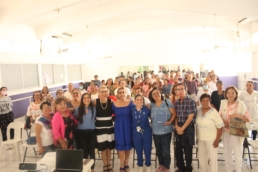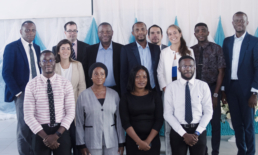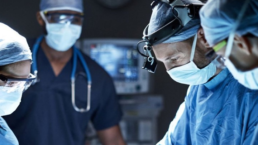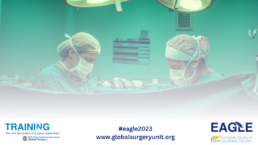Mexico Hub Community Event Educates on Wound Care
In a bid to empower patients, the GSU Mexico Hub held a community engagement event at the DIF Ruiz Cortines Community Centre, Veracruz on wound care and infection prevention on 22nd February. Dr. Carolina, a dedicated research physician, spearheaded the informative session aimed primarily at the elderly demographic within the community.
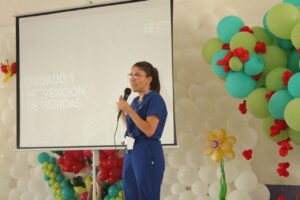 The event, attended by 70 people, commenced with an insightful inquiry into the common remedies employed by attendees for wound healing at home. Many disclosed the use of potentially harmful substances like laundry detergent, eggs, and even urine. Such practices, though prevalent, were underscored as detrimental to skin health.
The event, attended by 70 people, commenced with an insightful inquiry into the common remedies employed by attendees for wound healing at home. Many disclosed the use of potentially harmful substances like laundry detergent, eggs, and even urine. Such practices, though prevalent, were underscored as detrimental to skin health.
Dr Carolina delved into essential aspects of wound management, highlighting crucial warning signs indicative of infection. Through a meticulous step-by-step demonstration, attendees were equipped with practical skills for effective wound care.
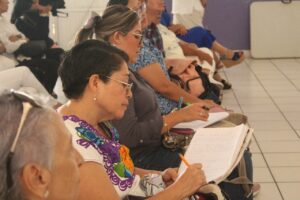 As part of the interactive segment, eight wound care kits were raffled off to attendees. The session culminated in a vibrant Q&A segment, fostering an open dialogue on wound management strategies. Participants also expressed a desire for future sessions covering topics such as diabetes management and pressure ulcer care. Such feedback underscores the pressing need to further educate this demographic on preventive healthcare measures.
As part of the interactive segment, eight wound care kits were raffled off to attendees. The session culminated in a vibrant Q&A segment, fostering an open dialogue on wound management strategies. Participants also expressed a desire for future sessions covering topics such as diabetes management and pressure ulcer care. Such feedback underscores the pressing need to further educate this demographic on preventive healthcare measures.
EAGLE 2 has launched!
Following on from publication of the EAGLE study last year, we are pleased to announce the launch of EAGLE 2.
EAGLE 2 will be a snapshot audit of patients undergoing right sided bowel anastomosis, but restricted to units who undertake the EAGLE online training. This training may have already been done (as part of the first EAGLE study), or surgeons in your team may complete it between now and May 2024. A key finding from the EAGLE study was that in centres where most surgeons undertook the training, the anastomotic leak rate fell by almost 50%. We need your help to grow engagement across as many hospitals as possible, so we can validate this finding. EAGLE 2 will be open to hospitals who participated in the original EAGLE study as well as new hospitals.
Units who undertake the EAGLE online training (either as part of ’EAGLE’ or between now and May 2024) prior to data collection can take part. The anticipated audit period will be May/June 2024. Results will be presented at ESCP 2024 in September, and published later this year.
You can find out more about the EAGLE study in the below video:
If you have any questions, please contact the team.
EAGLE 2 Launch

EAGLE 2 Launch
Following on from publication of your EAGLE study last year, we are pleased to announce the launch of EAGLE 2. You are invited to join a webinar on Thursday 01st February at 15:00 GMT / 16:00 CET to hear more about the study. Please register your interest here.
EAGLE 2 will be a snapshot audit of patients undergoing right sided bowel anastomosis, BUT restricted to units who undertake the EAGLE online training. This training may have already been done, or surgeons in your team may complete it between now and May 2024. The training platform is available – open access – at https://eagle-escp.eu.com/.
A key finding from the EAGLE study was that in centres where most surgeons undertook the training, the anastomotic leak rate fell by almost 50%. We need your help to grow engagement across as many hospitals as possible, so we can validate this finding.
We anticipate that EAGLE 2 will recruit patients between May - June 2024. The results will be submitted to the BJS for publication after presentation at the ESCP conference in Greece (September 2024).
EAGLE 2 will be open to hospitals who participated in the original EAGLE study as well as new hospitals.
Contact J.Keatley@bham.ac.uk if you have any questions and we hope to see you at the webinar on 01st February.
WOLVERINE Unleashed!
The launch webinar for the latest ESCP audit and cohort study ‘WOLVERINE’ took place on 07th November. The aim of this study is to conduct a prospective cohort study and audit in wound closure and SSI prevention following abdominal surgery.
Presentation
Panel Discussion
Amongst the panellists were GSU hub representatives from Ghana (Prof. Stephen Tabiri, Dr Napoleon Bellua Sam) and India (Dr Parvez David Haque).
WOLVERINE has 2 recruitment periods;
- Period 1: 01st November 2023 to 15th December 2023 (audit only)
- Period 2: 02nd January 2024 to 31st March 2024 (audit + elective cohort study)
Patient recruitment for the period 1 audit is now underway and you can register your centre to join here. More than 160 centres have already registered to participate.
If you have any questions please contact wolverine@contacts.bham.ac.uk.
Upcoming Webinar On New WOLVERINE Study
The European Society of Coloproctology (ESCP) latest audit and cohort study, Wound Closure and Surgical Site Infection Prevention Strategies in Abdominal Surgery (WOLVERINE) was launched at the Global Reach Symposium at ESCP's 2023 Conference in Vilnius, Lithuania.
The aim of this study is to conduct a prospective cohort study and audit in wound closure and SSI prevention following abdominal surgery. The study will have two data collection periods, one beginning in November 2023, and a second beginning in January 2024. Interested sites can register here. Sites can take part in either the audit alone (November 2023), or the audit and cohort study (January 2024).
Join our upcoming webinar on 07th November to find out more about WOLVERINE. Book your place at https://www.ticketsource.co.uk/escpstudies.
GSU Research Fellows, Staff Deliver Surgical Research Lectures in Nigeria
Research fellows and staff of the NIHR Global Surgery Unit (GSU) visited Obafemi Awolowo University (OAU) in Ile Ife, Nigeria on the 14th-15th of September 2023 to deliver a series of lectures to medical students, surgical residents and other health care professionals.
The GSU contingent was composed of Dr Dmitri Nepogodiev- Public Health registrar and Academic Clinical Lecturer; Drs Maria Picciochi and Virginia Ledda- Clinical PhD Fellows; Dr Omar Omar- Senior Statistician and Epidemiologist, and Mr Michael Bahrami-Hessari- Community Engagement and Involvement (CEI) manager.

The first lectures delivered on the afternoon of the 14th were aimed at 4th and final year medical students and included fundamental topics on the purpose of research and identifying a good research problem. This was followed by practical advice on how a research abstract is written and how an effective academic poster is constructed. Highlights of the GSU cluster randomised trial CHEETAH and DRAGON- an upcoming trial aiming to compare reusable versus disposable surgical drapes and gowns, were also presented. The session ended with the GSU visitors sharing practical tips on how to develop a career in research.
On the morning of the 15th, a research forum was held specifically for surgical residents and tackled topics such as generating research ideas, getting patient input and choosing the appropriate study design, research ethics, the basics of statistics, presenting and publishing research and how research can influence health guidelines and practice.

Finally, in the afternoon of the same day, a symposium on global surgery was held with a variety of health professionals in attendance. Topics included the sharing of the highlights of our randomised controlled trials (FALCON, CHEETAH, PENGUIN, DRAGON), cohort studies (COVIDSurg, HIPPO), health economics analysis (LION) and our CEI initiatives most notably the development of our community and patient education toolkit.
OAU is a spoke within the Nigeria Hub and has been a top recruiter in GSU trials.
Checklist Developed by the GSU could Help Surgical Teams Prepare for Summer Pressures
Checklist developed using data from GreenSurg Collaborative led survey could help surgical teams in low- and middle-income countries to prepare for issues relating to global warming.
The “Operating Theatre Heatwaves Checklist” has been developed by researchers to summarise four key points that should be taken into account by clinical operation based teams when looking at the development of strategies to reduce any issues arising from prolonged periods of abnormally hot weather. The team were able to analyse data from 20 specialities across 140 UK hospitals that operated during the UK heatwave of July 2022.
From the data that was analysed during the study, the checklist asks the following questions which should be taken into account when looking to reduce the impact from prolonged periods of excessive heat:
- Do you have an operating theatre heatwave plan?
- Can your operating theatres function during heatwaves?
- Do you have a plan in the case of staff shortages?
- Is there a heatwave-related surge in emergency admissions – can surgical activity be maintained?
Members of the research team were able to present the checklist at the Faculty of Public Health Climate and Health Conference, taking place on the 21st June with a focus on the subject of “Adapting to a warming world from the UK perspective”, attended by a multitude of of professionals from the food systems, built environment and healthcare international industries.
The United Nations defines Climate Change as long-term shifts in temperatures and weather patterns that have been primarily driven by human activities, particularly since the 1800s. As climate change intensifies, the ramifications of raising temperatures (one of the effects of elevated greenhouse gas emissions derived from the burning of fossil fuels) will have a direct impact on us all, with the global healthcare sector being particularly prone to issues arising from increasing global temperatures.
You can view the full checklist by clicking here.
You can also view the original GreenSurg publication Elective surgical services need to start planning for summer pressures, published in April 2023 by clicking here.
Education and Training Webinar: EAGLE Study Video Available Online
You can now view the video from the online webinar that took place on Monday 5th June on the NIHR Global Health Research Unit on Global Surgery (GSU) Youtube channel
Anastomotic leak is a severe, potentially life-threatening complication following right colectomy. Internationally, anastomotic leak occurs after 8% of right colectomies. Prospective cohort data demonstrate that patient selection, intraoperative factors, and technical variation are risk factors for anastomotic leak. EAGLE was an international quality improvement programme to share best practice and harmonise procedures for surgeons and the theatre teams so that they might perform the best possible anastomosis for each particular patient. The study was carried out by 350+ hospitals across more than 60 countries.
The online webinar video chaired by Prof. Dion Morton provides all those working in surgical practice and research with an overview of the ground breaking global study EAGLE which is due to be published soon. The hour long video includes the following highlights:
- Study background – ESCP RH Audit
- Panel Discussion – Why is a Study Required?
- EAGLE Study Design
- EAGLE High Level Results
- Breakout Room – Introduction to Research Methodology
- Panel Discussion – Could the QI Intervention be Implemented in Practice?
- Future Directions
You can view the video by clicking here.
More information on EAGLE can be viewed by clicking here with further information on the Education and Training Programme viewable by clicking here.

